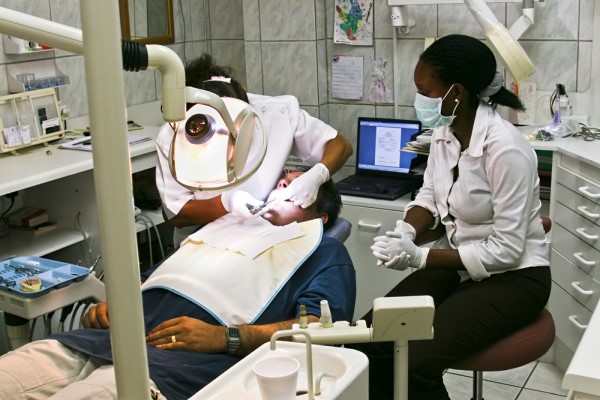 Our implant dentist is here to help if you are considering getting dental implants. These are metal rods/screws that are placed into the jaw to replace missing teeth roots. Implants serve as bases for dental restorations that replace missing teeth like crowns, dentures, and bridges.
Our implant dentist is here to help if you are considering getting dental implants. These are metal rods/screws that are placed into the jaw to replace missing teeth roots. Implants serve as bases for dental restorations that replace missing teeth like crowns, dentures, and bridges.
Implants are often compared to real teeth since they do not need special maintenance or care, plus they feel natural in the mouth. Implants typically last a lifetime, so they provide a permanent solution for missing teeth.
Replacing the roots that fall out with missing teeth helps to preserve jawbone tissues. These tissues deteriorate when teeth fall out due to not getting the stimulation they need to create healthy new cells. Implants replace missing teeth roots and transfer bite forces into the jaw, giving tissues there the stimulation they need.
Figuring out if you need a consultation with an implant dentist
Not sure implants are right for you? Here are some reasons why a trip to an implant dentist might be in order:
1. You are missing one or more teeth
Implants can be used to replace one or more teeth. Single implants are typically recommended when a patient has only one missing tooth. The implant is fitted with a crown once it has fused with bone tissues around it through osseointegration.
Multiple implants are required for patients who have lost multiple teeth. Multiple single implants might be used to replace individual teeth by attaching crowns to them. They can also be combined with restorations used to replace multiple teeth like dentures and bridges.
Implant-supported bridges might be recommended when a patient is missing a row of teeth next to each other. These usually involve placing an implant in both ends of the gap created by the missing teeth and using the implants as bases for a dental bridge.
Implant-supported dentures are typically recommended for patients who have lost most of their teeth on a dental arch. It involves placing four to six implants on each dental arch and attaching special dentures to them.
2. You have a severely infected tooth
Root canals are the standard treatment for teeth infections, but it is not always possible to save an infected tooth. At times, the risk of the infection spreading into the bloodstream is too high to risk a root canal. Extractions are typically recommended in such scenarios. Implants are often suggested for extracted teeth since they ensure the jawbone continues to get the stimulation it needs to be healthy.
3. Your tooth is severely damaged
Severely damaged teeth are often treated with root canals, followed by rebuilding the tooth with composite resin or placing a crown. However, a dentist might be unable to save a tooth if the damage to it affects its root. For example, a fractured tooth can be saved with a root canal only if the damage does not reach its roots. Dentists typically recommend extracting teeth that cannot be repaired or restored. They can then be replaced with implants.
Find out if implants are right for you
A consultation with our dentist is all you need to determine if dental implants are right for you. Give us a call or stop by our Brevard clinic to set up an appointment.
Request an appointment or call Carolina Smiles Family Dental at 828-974-3326 for an appointment in our Brevard office.
Recent Posts
People with tooth loss can smile with confidence again, thanks to the help of an implant dentist. Tooth loss can greatly impact a person's quality of life, affecting how they speak, eat, and feel about their smile. Also, tooth loss can eventually lead to bone loss and changes in facial structure. Fortunately, an implant dentist…
Oral health plays a vital role in your overall well-being. Dental advancements have revolutionized dentistry and can replace missing or damaged teeth and restore smiles. Implant dentists provide patients with effective and long-lasting solutions for missing teeth. This blog post will discuss common treatment options offered by implant dentists.Dental implants are small titanium posts that…
If you are considering dental implants to replace missing teeth, you might want to talk with an implant dentist first about what getting implants entails, including aftercare for your implants. The dentist will be able to share with you how the procedure will work, what recovery looks like, and what you should be doing to…


